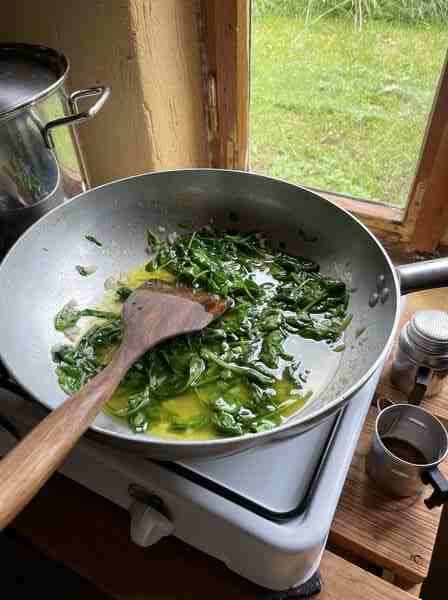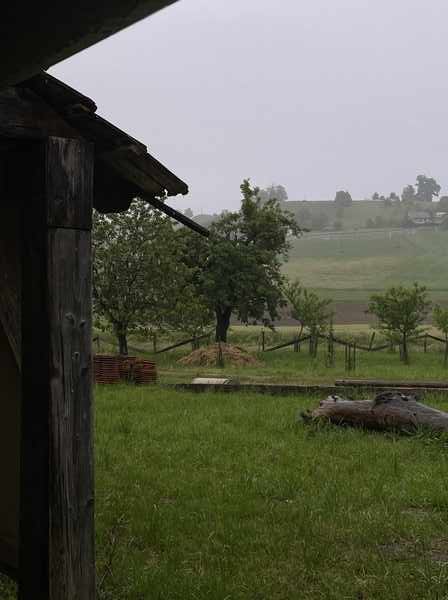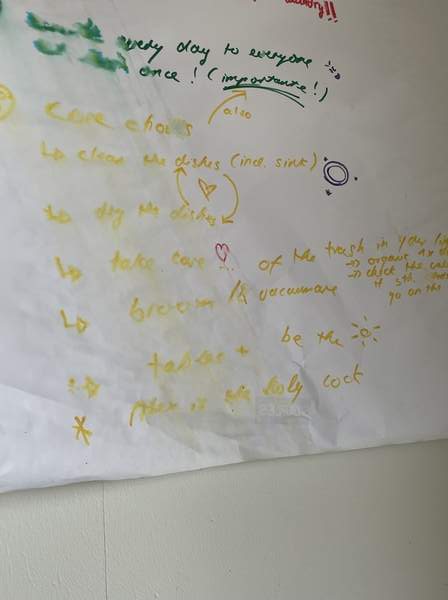meeting Robi, the ornithologist
After a cold shower (with not much water pressure, which was promptly fixed), the day started with a session with Robi, the ornithologist. He was warmly introduced by Nataša, and soon one would understand why: he was very passionate about the subject of nature, birds, ecology, fields which he delved in by the means of self-learning.
At first, Nataša aided him in translating his native Slovene to English, but we all soon realised he could very well stand on its own. His first comments were coloured with excitement: just before we started, he had noticed the birdsong of the hoopoe, whose situation has been a point of concern for him and the association he takes part of: Popps. An ornithologist for 25 years, he doesn't need much to get him started on some passionate topics of his; thus, we learned about the plans for a new hydroplant in the Mur river (passing a little above Jurovski Dol) – plans that, he believes, will not come to fruition, due to, albeit not only, the association's efforts) – and the precarious situation of the hoopoe species in Slovenia.
Birdwatching, he says, is not done necessarily for the sake of aesthetic pleasure, be it the beautiful colours of the species' feathers or the intricate birdsongs they are capable of producing. Many of these birds act as a tell for the ecological situation of a particular site, or ecosystem, and are themselves part of a more complex chain of actors with various connections among each other. The surrounding area to where we sat was particularly poor in the sixties – lots of famine, in particular – and one measure to increase food output involved the use of pesticides. These, in turn, drove the species away, which increased the available population of braman. The imbalance was created: braman, on the other hand, loves to feast on farms and their vegetables, and it was not uncommon to see it eat from the tomatoes and potatoes. There's an even more drastic example with the european roller. There hasn't been a sight of it in more than ten years, as there was sudden changes to its habitat near the small streams running through the valley.
In fact, most of these problems seem to arise from human interventions into agriculture, which stem from various different reasons. While overlooking the opposite side of the valley, he invites us to notice how very few trees we see in the horizon: it's mostly cultivated open fields. Other issues, like the frequent cutting of the wild grasses – which are the habitat for many different bugs, and even a place for flowers to bloom which consequently feed the bee population – will provoke a lack of food for the birds, which then have to migrate elsewhere. The situation in neighbouring countries, like Hungary, Croatia and Serbia, is better; but that is mostly to the sheer size of their territories, which, by lack of human intervention, still has many areas of untampered wild life.
Robi seems to have a good understanding of the number of nests and count of each species. We learn about the white stork and the black stork, and at some point he shares that he hasn't remembered so much rain, and specially so late in the year, in the last 50 years. Sometimes, we get interrupted by some birdsong – such was the case with the black woodpecker – or we can pay attention to the surrounding soundscape, realising the birds really are present everywhere.
Shortly after, we say our goodbyes: najlepsa hvala, in se vidimo! – thank you very much, and we shall see each other again. For the next time, maybe we'll go on the field, near the Mura river, to see and listen to some birds.
second lunch with Riccardo, with pasta and soup
Riccardo and Tiago are still in the farm – we spent so much time together yesterday that it feels like way over than a week, let alone a single day. Given that yesterday was a little chaotic, we outright established some tighter deadlines for serving the food; the plan, too, was much less ambitious: pasta al aglio e olio, and a traditional Slovene soup.
To be honest, I found this quite exciting: I don't really know how to make proper pasta (I was also under the impression most of it contains eggs; and, in general, I don't go too much for heavy carbohydrate-based foods), and of all people, Riccardo and Daniele were likely great guides. So we split the group in two, and I got in the sweetest end of the deal: Luka and I would be in charge of the pasta, a much more simple endeavour as there was almost no vegetable cutting involved, and we also got to hang around the kitchen, which is quite homely.
We cut a big dose of garlic, and put it in a pan with lots of olive oil. In fact, we also used some sunflower oil (little Riccardo secret). After a while, the fire was put down, and some spinach was added: it would cook and reduce with much less heat, and it felt like a more gentle process for the greens overall. So this was the sauce; the pasta was done on the side, and it really did not take so long. After it was cooked, it was strained and put on the same pan as the sauce, then mixed (and with a little more sunflower oil, because Riccardo is really keen on having it).


The soup, however, was a much bigger point of contention. Given that it was a Slovene dish, there was a much higher expectation and pressure on it. As the pasta was done much earlier, the group assembled inside the kitchen for the preparation of the soup, and it was tasted at many different steps of the process. We discussed how much sourness is accepted, and how it would evolve over time as the cooking ensued. At some point, a Slovenian friend of Nataša dropped by, and was treated some soup. He found it good and tasty, as we heard, but noticed right away the lack of meat in it.
To have a meal with so many people – nine in total! – is a great feeling. Daniele, Tiago and Nataša had been working on a shed for the sheep during the whole morning, so I suppose their meal was particularly cherished – field work really makes one value a good meal, and unfortunately we haven't worked much, given the current weather situation. We had some leftover croquettes, the recycled fried bread, the pasta (it was delicious!), and some frittata (?). A big feast, for a big, fun, food-loving group.
later in the evening, back in the kitchen
Nataša wanted to meet us later in the afternoon, and we had some three hours in the evening to spare. I practiced some Slovene, went for a walk in the village, and came back for a small nap. These moments feel very precious. As for the meeting, it's always a nice moment to stop and collectively reflect on what has been happening. This is also the first long-term volunteering project in Zelena Centrala, and so some of the dynamics are also quite new for Nataša; luckily, I feel the communication has been really kind and thoughtful throughout the whole process. Hopefully everyone else receives the same level of care in other volunteering projects.
After the meeting, we were back to cooking. If on one hand it's really nice to have these collectively cooking moments, it sort of leads to a little overeating, and overindulging in delicious food. Specially given that the weather is not so good, I tend to exercise much less than usual – I feel I should find a way to do some proper activity in these circumstances. But I digress. The plans for the afternoon were as simple as to do some desserts, and the vegan muffins were on the table!
Everything went quite well, as always. Cooking as a group is so much more fun and rewarding; eating together, too. This brings to mind a frequent feeling of mine, one that was present throughout much of this last year: cooking and eating (more the former, in my case) are too good to be done alone.
a nomination as resident cook
After dinner, we made some commitments in terms of house chores and cleaning duties, and it turns out cooking is not as popular among the group as it is for me. That, combined with their apparent trusting of my capabilities, put me in charge of the cooking every day.

We finished this long day around the kitchen table, listening to some very pleasant old slovenian music, being silly, having some vegan biscuits, practicing our Slovene. I'm way past my bedtime (it should ideally be, at most, 11PM), but then almost nothing is going by the book these last couple of days. This has been great, so far.